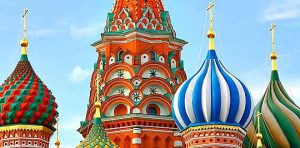A new report from GlobalData states that the fallout from Russia’s invasion of Ukraine in February will cause a slowing in the growth of the country’s life insurance industry over the next few years.
 The data and analytics firm says in its Russia Life Insurance: Key Trends and Opportunities to 2026 that gross written premiums (GWP) in the nation are expected to decline by 7.3% in 2022 compared to the 21% growth achieved in 2021. The report also says that life insurance GWPs are forecasted to record a low compound annual growth rate (CAGR) of 3.1% over 2021-26 compared to the 11.5% CAGR seen during the period 2017-21.
The data and analytics firm says in its Russia Life Insurance: Key Trends and Opportunities to 2026 that gross written premiums (GWP) in the nation are expected to decline by 7.3% in 2022 compared to the 21% growth achieved in 2021. The report also says that life insurance GWPs are forecasted to record a low compound annual growth rate (CAGR) of 3.1% over 2021-26 compared to the 11.5% CAGR seen during the period 2017-21.
Katam Prasanth, Insurance Analyst at GlobalData, said: “Russia is one of the few countries where the life insurance segment recovered quickly from the impact of the COVID-19 pandemic. However, as a result of the country’s invasion of Ukraine and the consequent imposition of heavy sanctions, Russia’s economy and its insurance industry has been significantly impacted with high inflation and worsening trade and economic conditions. GlobalData estimates that Russian GDP will contract by 12.3% and inflation will remain above 15% in 2022.”
The nation has been hit with crippling sanctions since it attempted to invade Ukraine earlier this year. Moves against the state included the UK government’s decision to implement further restrictions on the ability of Russian businesses to access insurance from the Lloyd’s and London Market.
A later move saw Russian companies in the aviation and space industries will be prevented from accessing UK insurance sector, in a move that leaders say will “severely limit” Russia’s access to the global insurance and reinsurance market.
Other sanctions have seen Russian banks severed from the global payments messaging system SWIFT, while the London Stock Exchange has also suspended trading for many Russian firms.
The fallout from the sanctions was immediate at the beginning of the year. In March, Reinsurance News wrote about how Ingosstrakh, the fourth-largest general insurer in Russia was facing significant financial challenges following Russia’s invasion of Ukraine.
In 2020, the insurer earned 36.3% of its RUB106.5bn ($910.1m) premium income in the Marine, Aviation and Transit (MAT) insurance market which has been severely affected by the ongoing conflict.
To curb the country’s high inflation, the Central Bank of Russia (CBR) first increased its benchmark interest rate to 20% in February, and then reduced it to 8% in July as inflation eased due to a strong Ruble. Higher than expected interest rates have made bank deposits more attractive compared to investment-linked life insurance (ILI) products, one of the major drivers of life insurance growth in the country. Furthermore, restrictions on investing in foreign bonds due to sanctions has led to a decline in demand for ILI products which is expected to continue into 2023.
Prasanth said: “As a result of all this market disruption, M&A activity is expected to increase as insurers’ investment opportunities are limited and smaller, with less-capitalized companies predicted to merge with the larger players in order to stay afloat.”
Many foreign insurers have announced plans to exit the Russian market altogether. Prominent amongst them is Generali who closed its representative office in Moscow, withdrew from Ingosstrakh where it owned 38.5% of the shares, and closed its Russian division of Europ Assistance. Allianz Group has also announced plans to sell its Russian operations to Zetta Insurance.
Prasanth added: “GlobalData expects Russia’s life insurance industry growth to remain subdued over the next few years as further economic and disruptive headwinds are anticipated resulting from the Ukraine conflict.”


